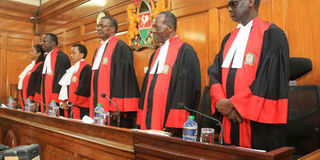Dissenting judges’ rulings on Nasa election petition deserve attention

Supreme Court judges from left: Njoki Ndung'u, Smokin Wanjala, Philomena Mwilu, David Maraga, Jackton Ojwang', and Isaac Lenaola prepare to hear the presidential election petition at the Supreme Court on September 1, 2017. PHOTO | JEFF ANGOTE | NATION MEDIA GROUP
What you need to know:
Throughout history, dissenting judgments have had a profound and influential impact on the subsequent development of laws rendered by the minority judges.
Besides the political implications of the six judges’ judgments, judicial history will inevitably be made.
On September 1, the majority of judges of the Supreme Court determined that fresh presidential elections must be held. As a result, on October 17, Kenyans will go to the polls to cast their ballots for their preferred presidential candidate.
The current debate has focused primarily on the ruling by the four judges of the Supreme Court but very little commentary, if any, has been made on the dissenting judgments by judges Njoki Ndung’u and Jackton Ojwang’.
Kenya follows the common law legal system as opposed to the Romano-Germanic system, commonly known as the civil law legal system.
However, throughout history, it has not been uncommon for minority judges to come up with different judicial findings contrary to the majority.
This is perfectly within their mandate and, in this instance, Kenyans are expecting three judgments that will be delivered as promised within 21 days of the Supreme Court ruling, where the majority had their way while the minority will have their say.
LEGAL KNOWLEDGE
However, as we wait for the judicial officers to deliver the full judgments, one by four judges, including Chief Justice David Maraga; and two others by Justice Ndung’u and Justice Ojwang, it is important to appreciate that Kenya is on a road to evolving its own legal knowledge or what lawyers call jurisprudence, since the promulgation of our liberal Constitution on August 27, 2010.
Under the circumstances, it is important to note that the Supreme Court, being the highest court whose judgments are final and binding to all the lower courts, though not to itself, is, indeed, a creation of the Constitution.
Throughout history, dissenting judgments have had a profound and influential impact on the subsequent development of laws rendered by the minority judges. Glaring examples are the decisions by the late Lord Denning of England, whose many judgments were often in the minority but those decisions later shaped the legal thinking by evolving critical jurisprudence in the justice system of England and indeed the whole of the Commonwealth.
INTELLECTUAL HONESTY
Having been a student of Prof Ojwang, I have the highest of unbound admiration for his impartiality and intellectual honesty.
I, therefore, look forward with a lot of curiosity to reading his minority judgment. I believe Kenyans can expect intellectual rigour, candour and well-reasoned judgment given his independence of thought, a fact many of his former students will attest. It is equally going to be exciting to read the judgment by Justice Ndung’u.
Their findings will probably rank equally important to that of the majority in the development of Kenya’s jurisprudence.
Many law practitioners are anxiously waiting for the three Supreme Court judgments, which will mark a major departure from the 2013 unanimous decision that upheld Mr Uhuru Kenyatta as the elected President.
JUDICIAL HISTORY
Besides the political implications of the six judges’ judgments, judicial history will inevitably be made. In keeping with the doctrine of separation of powers to which the 2010 Constitution entrenched in our governance as a consequence, hopefully, Kenya will be on the right track in demonstrating the value of the independence of the three branches of government — the Parliament, the Executive and the Judiciary.
This independence, however perceived, will go a long way in nurturing and building confidence in institutions while strengthening our democracy by entrenching the doctrine of the rule of law and due process as an instrument of governance of our country.
Nevertheless, democracy comes with a huge price tag. This is manifest when you consider the proposed Sh12 billion budget envisaged to be appropriated by Parliament to meet the cost of a fresh presidential election, to which the Kenyan taxpayer must and will pay.
The writer is an advocate of the High Court of Kenya.





